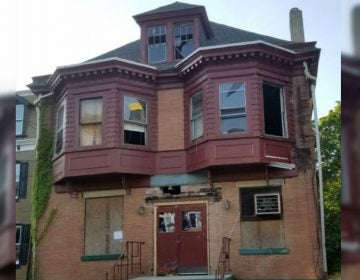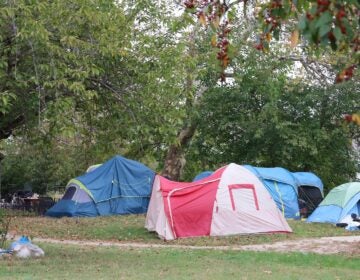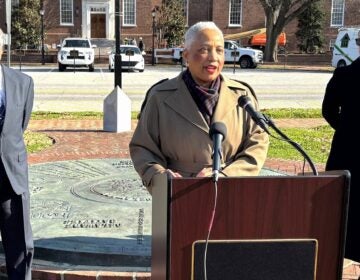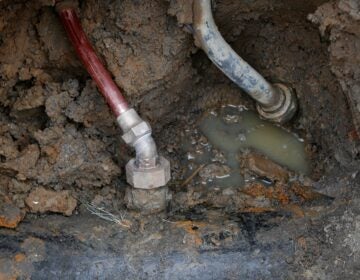‘It puts you in tears’: Wilmington Council aims to hold landlords accountable with ‘blight bill’
The bill no longer includes a fee increase for landlords and won’t pertain to people who live in their own homes but can’t afford repairs.
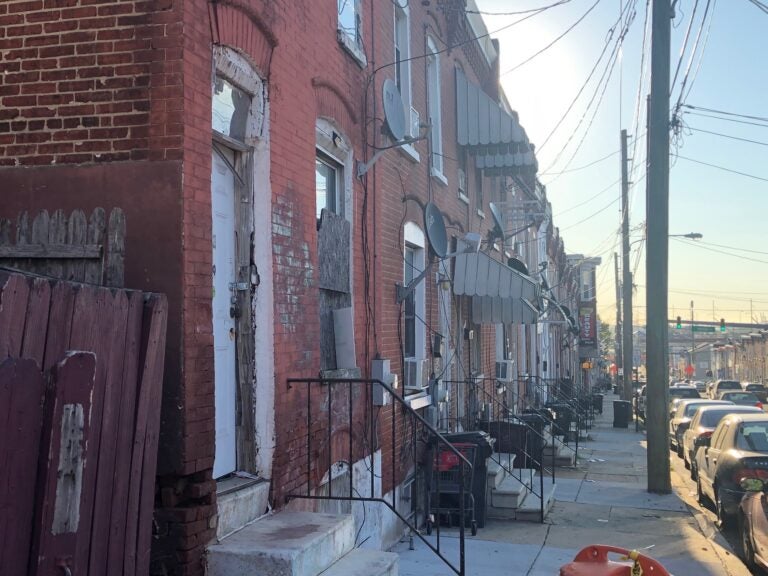
Wilmington aims to hold landlords accountable to tenants in neighborhoods such as Hilltop west of downtown. (Cris Barrish/WHYY)
An effort to change Wilmington’s housing code and hold slumlords accountable for their neighborhood eyesores is headed for a City Council vote this week after years of negotiating.
The so-called “blight bill” has faced opposition because it initially included people who live in their homes and might not be able to afford repairs, and because it increased the annual registration fees paid by landlords.
But now the fee hikes have been removed and the changes only apply to landlords. Fines would now become civil citations rather than criminal charges, so landlords who want to stall or not make repairs would not be able to drag out their cases for months or even years.
The bill also includes a sunset provision after three years.
“I think we have the votes,’’ said Councilwoman Zanthia Oliver, whose district on the city’s East Side and Northeast sections struggles with vacant rowhouses and occupied ones where tenants live in what she calls “horrible conditions.’’
Oliver said she’s pleased that the bill proposed by Mayor Mike Purzycki’s administration will no longer pertain to those who live in their homes and fall behind on upkeep. Those residents can still be cited for violations, however.
She said the rewritten bill “really just targets the slumlords” and would “assist individuals who are renting from landlords who really just don’t care about their properties.”
A recent tour of some problem properties was eye-opening and revolting, Oliver told WHYY.
There were “leaking faucets, toilets hanging off, mold, just poor living conditions. Tubs are black. It’s just a mess. It puts you in tears,’’ she said.

Purzycki and his office did not agree to an interview about the bill’s prospects, but during a 2019 community meeting, he pitched the bill by comparing blight to disease.
“The perfect metaphor is cancer, because it grows’’ and destroys the character of streets and neighborhoods, Purzycki said. The mayor, who has won a second term, says addressing the problem is a priority.
Purzycki also argued that the current code is flawed because the criminal process can be slow, leading to delays that last for months.
“Meanwhile, that canker sore is looking at you every single day because we can’t do anything about it because we have to wait for a judge’s order,” Purzycki said then.
The bill’s sponsor, outgoing Councilman Charles M. “Bud” Freel, said he hopes the bill will finally pass at Thursday’s meeting.
“This bill has been so difficult,’’ he said Monday. “I just think it deserves a vote up or down.”
Nearly half of Wilmington’s 33,000 residential properties are occupied by renters, according to city officials. About 4,000 properties are vacant, officials said.
Landlords had fought some provisions, including one that raised annual fees to $100 a year per unit. Currently, a landlord with three units pays $120 a year total, plus $10 annually for each additional unit.
Freel said he dropped the increase because many renters are experiencing financial difficulties from the coronavirus pandemic and didn’t want higher fees passed on to them.
Brian O’Neill, who runs the group Greater Wilmington Housing Providers, said he is pleased the registration fees won’t be raised but still worries that overzealous inspectors could unfairly target good landlords for minor violations that lead to “excessive fines” that start at $250 for each violation.
Overall, O’Neill said his members endorse measures to make slumlords clean up their properties or pay hefty fees — or get out of the rental business.
“You can drive just about any of the neighborhoods and you can see bad properties,’’ said O’Neill, whose company has 42 rentals all across the city.
“I’m all in support of going after the worst of the worst of the worst. It’s just been my experience and my fear that you will have some rogue inspectors who could take this to an extreme against the very people who are trying to do a good job in the city.”
O’Neill also said that after three years, when the new code would be up for renewal, he hopes the city takes suggestions about making improvements.
Oliver said there might be an amendment added before Thursday’s vote that would have a quicker sunset period, perhaps a year, to gauge its effectiveness and make necessary changes.
Freel countered that one year might not be enough time to assess the code changes but pointed out that the council can change the law before then if members want.

Get daily updates from WHYY News!
WHYY is your source for fact-based, in-depth journalism and information. As a nonprofit organization, we rely on financial support from readers like you. Please give today.



